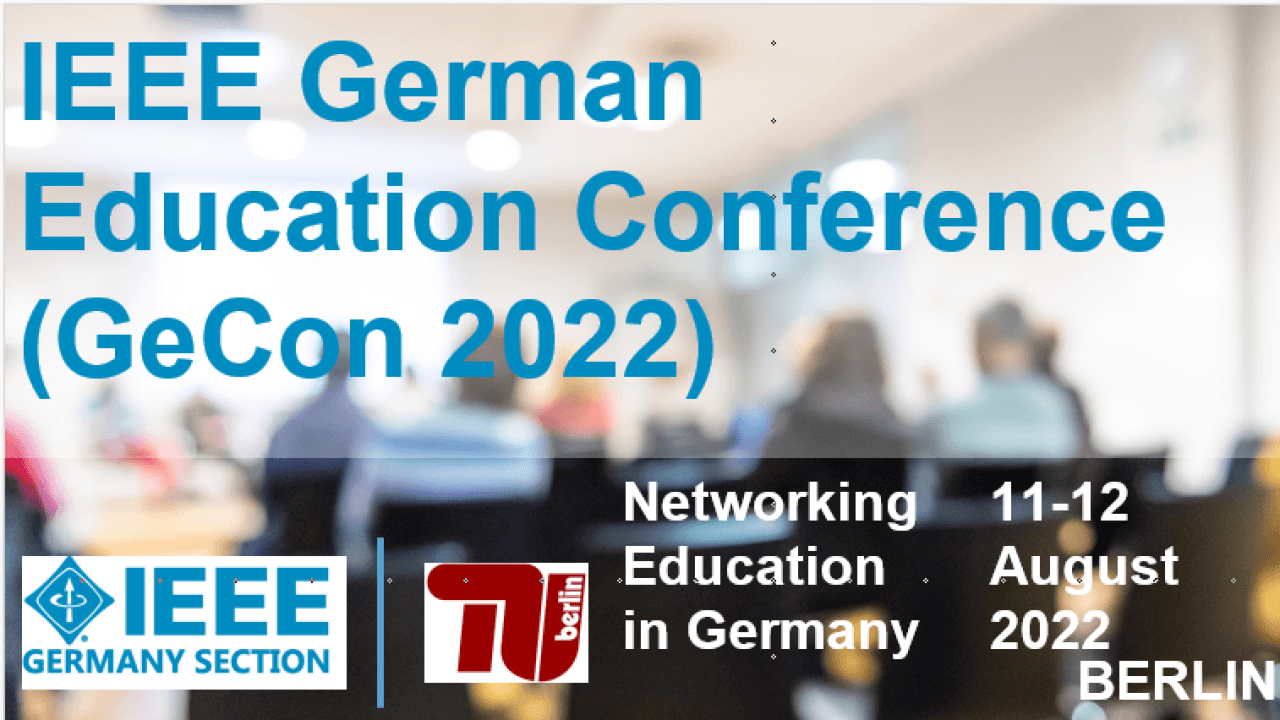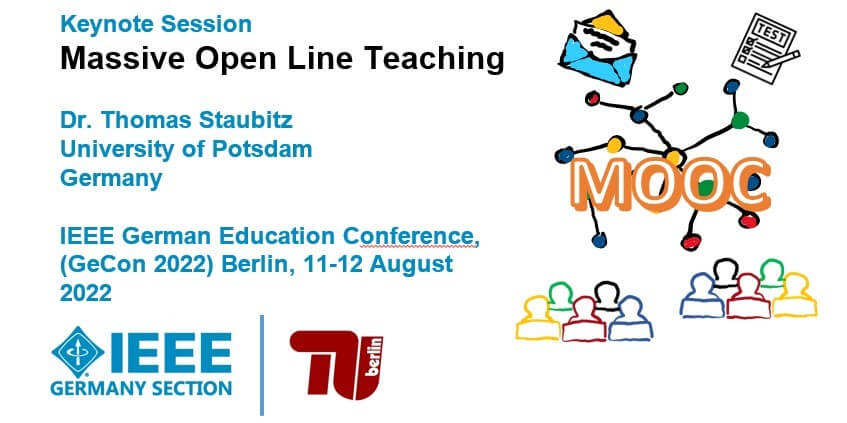IEEE German Conference on Education (GeCon 2022)
BerlinThemed "Networking Education in Germany", the hybrid IEEE German Conference on Education (GeCon 2022) aims to provide a platform to discuss teaching concepts and methods in German academic institutions, including universities, universities of applied sciences, and distance learning universities. Hosted by IEEE Germany Section and locally organized by TU Berlin, challenges and approaches in Higher Education will be highlighted through oral presentations and posters. The conference will also organize workshops to discuss and interchange recent experiences regarding online teaching, labs, and evaluations, the students’ perspectives, and the financial support for conducting research in education as well. Submitted papers (4-6 pages) will be peer-reviewed, Submitted papers (4-6 pages) will be peer-reviewed, and approved papers will be submitted for inclusion in IEEE Xplore. Submissions are invited, but not limited to, the following topics: Online courses: Remote teaching of hands-on activities, best practices on the assessment and evaluation in online courses, Massive Open Online Courses (MOOCs), novel teaching modalities: podcasts, interactive videos, etc. Non-traditional teaching in STEM education: Digital Game Based-Learning, Project-based learning, Methodologies to teach soft-skills in STEM careers. STEM Education Initiatives. Role of education regarding new paradigms and technologies: Industry 4.0, IoT, IoE, 5G, or 6G Important dates Conference submissions: 17 Jun 2022 Notification of Acceptance: 08 Jul 2022 Camera Ready Submissions: 22 Jul 2022 Conference Sessions: 11 Aug 2022 - 12 Aug 2022 Please visit the webpage of the conference for further details, call for papers, and submissions at https://www.gecon2022.org/ Hope to see you soon in Berlin! With kind regards, GeCon 2022 Committee https://www.gecon2022.org/
IEEE German Conference on Education (GeCon 2022)
OnlineThemed "Networking Education in Germany", the hybrid IEEE German Conference on Education (GeCon 2022) aims to provide a platform to discuss teaching concepts and methods in German academic institutions, including universities, universities of applied sciences, and distance learning universities. Hosted by IEEE Germany Section and locally organized by TU Berlin, challenges and approaches in Higher Education will be highlighted through oral presentations and posters. The conference will also organize workshops to discuss and interchange recent experiences regarding online teaching, labs, and evaluations, the students’ perspectives, and the financial support for conducting research in education as well. Submitted papers (4-6 pages) will be peer-reviewed, Submitted papers (4-6 pages) will be peer-reviewed, and approved papers will be submitted for inclusion in IEEE Xplore. Submissions are invited, but not limited to, the following topics: • Online courses: Remote teaching of hands-on activities, best practices on the assessment and evaluation in online courses, Massive Open Online Courses (MOOCs), novel teaching modalities: podcasts, interactive videos, etc. • Non-traditional teaching in STEM education: Digital Game Based-Learning, Project-based learning, Methodologies to teach soft-skills in STEM careers. • STEM Education Initiatives. • Role of education regarding new paradigms and technologies: Industry 4.0, IoT, IoE, 5G, or 6G Important dates • Conference submissions: 17 Jun 2022 • Notification of Acceptance: 08 Jul 2022 • Camera Ready Submissions: 22 Jul 2022 • Conference Sessions: 11 Aug 2022 - 12 Aug 2022
The openHPI Learning Platform – Successfully Creating a Virtuous Cycle of Teaching, Development, and Research
BerlinDear researcher, GeCon 2022 is announcing a new Keynote speaker to take place on August 11th-12th related to Massive Open Line Courses (MOOC). Due to the impact of Corona on traditional teaching in classrooms, new approaches concerning online teaching strategies have been abruptly applied by all of us. We hope this Keynote speech will support the research community's efforts. We look forward to seeing you at this hybrid conference in Berlin!!! TITLE: The openHPI Learning Platform – Successfully Creating a Virtuous Cycle of Teaching, Development, and Research. ABSTRACT: In 2012, the New York Times proclaimed the “Year of the MOOC”. In September of the same year, the first course with thousands of participants went online on openHPI, the Hasso Plattner Institute's new learning platform. In 2020, due to the pandemic, the “Second Year of the MOOC” was proclaimed by the media. End of 2021, the number of enrollments on openHPI has passed the first million. About a hundred courses have been offered on the platform so far. Meanwhile, the success of the platform and the course format convinced others. The HPI now operates about ten instances of the learning platform for partners in different contexts including corporate education (SAP), information for first responders and the public during pandemic outbreaks (WHO), national and federal research projects (AI-Campus, eGov-Campus), teacher education (lernen.cloud) and more. Beginning of 2022, the course enrollments on all platform instances in total have reached about 15 million. Enrollment numbers are one side of the coin, success rates are the other. While, generally, MOOCs are often criticized for their low course completion, openHPI boasts comparably good success rates. One of the success factors of the platform is that teaching, development, and research are heavily intertwined. Research topics are: social learning, learning analytics, game-based learning, storification, automated assessment, peer assessment, teamwork, chatbots, or mobile learning, to mention just a few. Every researcher is involved in the development of features that are related to their research and every researcher has been teaching at least one course on the platform. Due to the pandemic, many new use cases and different educational approaches had to be handled by the platform. Smaller courses, internal courses, blended courses, etc. often with very different requirements. The presentation will provide insights on successful course design, platform features, research results, and challenges that arose from the pandemic. Dr. Thomas Staubitz is a Senior Lecturer at the Hasso Plattner Institute at the University of Potsdam. He has been a member of the Learning and Knowledge Engineering research group at the chair of Professor Christoph Meinel since 2013 and is significantly involved in the openHPI project. He is responsible for several related projects, such as AI-Campus, eGov-Campus, or Corship. His research focus is on virtual teamwork in scalable learning environments and peer assessment. Other topics include online exams, online proctoring, and automated assessment of programming tasks. He has been involved in the production and delivery of about 30 MOOCs and SPOCs in various roles, both in front of and behind the camera.



